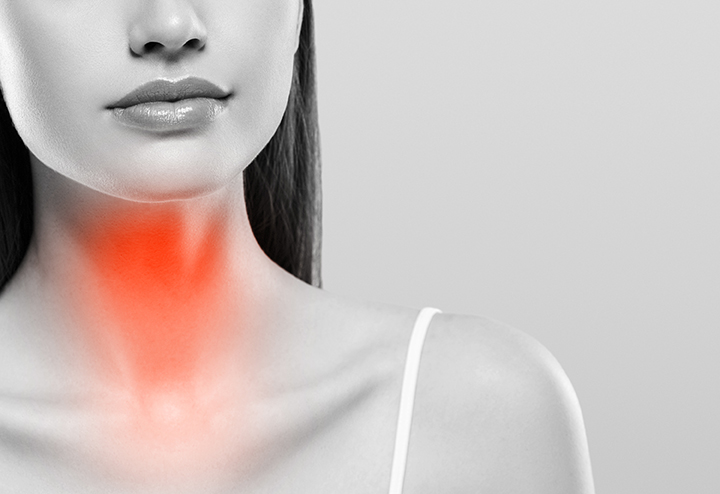What is thyroiditis?
Thyroiditis is the inflammation of thyroid glands. It is enlarged thyroid glands that is caused due to various reasons. It is a thyroid problem that belongs to the category of inflammatory diseases. Thyroiditis can be caused due to infections, autoimmune conditions, and even pregnancy.
Types of Thyroiditis
Thyroid glands can get inflamed due to various reasons. While an infection can cause enlarged thyroid glands, it is also possible to have thyroiditis due to autoimmune conditions, medications, and other factors. However, endocrinologists broadly demarcate thyroiditis into these categories:
- Chronic thyroiditis caused due to autoimmune conditions (Hashimoto’s thyroiditis, Graves’ Disease)
- Postpartum thyroiditis that affects pregnant women after delivery (usually in the first postpartum year)
- Acute thyroiditis that is caused due to infections
- Subacute thyroiditis caused due to viral infections
- Drug-induced thyroiditis that is the reaction of certain medications
- Radiation-induced thyroiditis
- Riedel’s thyroiditis
The most common form of thyroiditis is Hashimoto’s thyroiditis that is an autoimmune thyroid disease.
Chronic Thyroiditis – Autoimmune thyroid disease
Autoimmunity is a condition in which the immune system of the body starts to attack cells of certain organs leading to autoimmune diseases. While type 1 diabetes is caused when immune system attacks the pancreas, autoimmunity of the thyroid glands leads to various thyroid diseases like Hashimoto’s thyroiditis and Graves’ disease. While Hashimoto’s thyroiditis manifests in the form of hypothyroidism, Graves’ disease is manifests in the form of hyperthyroidism.
Thyroid autoimmunity
In this case, enlarged thyroid glands are the consequence of autoimmune thyroid diseases. It affects women more than men. Autoimmune thyroid disease is caused due to a condition called thyroid autoimmunity.
Thyroid autoimmunity is an immunologic condition where environmental, and genetic components together trigger the immune system to attack enzymes that are responsible for thyroid hormone generation. This leads to an enlarged thyroid gland and thus thyroiditis.
The immune system in autoimmunity starts attacking the cells of the body. In the case of thyroid autoimmunity, autoantibodies attack thyroid peroxidase and thyrotropin receptor. This leads to the inflammation of thyroid leading to enlarged thyroid. This also leads to conditions like Hashimoto’s thyroiditis and Graves’ disease.
Thyroid autoimmunity is exacerbated by genetic and environmental factors. The genetic factor lies in the HLA gene complex and T-cell regulating genes. Environmental factors like smoking, viral infections, iodine intake in diet, and stress exacerbate the risk of developing autoantibodies. These autoantibodies attack thyroid peroxidase, thyroid stimulating hormone receptor, and thyroglobulin leading to autoimmune thyroid diseases.
Lymphocytic thyroiditis – Postpartum Thyroiditis
This condition causes enlarged thyroid due to an autoimmune thyroid disease. Lymphocytic thyroiditis or postpartum thyroiditis is a silent condition that is caused due to the infiltration of lymphocytes. This is a silent condition as it does not cause any neck pain or tenderness. This thyroid disease is self-limiting, but only in a few cases it leads to permanent hypothyroidism. Know more about postpartum thyroiditis here.
Acute Thyroiditis
Acute thyroiditis is an infectious thyroid disease. This leads to inflamed or enlarged thyroid glands. Infectious thyroiditis is rare and is caused by bacteria, fungi, protozoa, flatworms, and mycobacteria. This condition occurs mostly in children who have a weak immune system.
Symptoms of acute thyroiditis
- Sudden neck pain
- Tenderness in the neck
- Fever and chills
- Neck mass characteristic of enlarged thyroid
- Difficulty swallowing
- Lymph glands that are swollen
Though thyroid function in patients with acute thyroiditis is normal, it needs immediate antibiotic treatment.
Acute Thyroiditis – diagnosis & treatment
Acute thyroiditis is diagnosed by physical examination, MRI scan, ultrasound, CT-scan, and aspiration of fluid from thyroid glands using a fine needle. Apart from these, thyroid function test is also performed.
Treatment for acute thyroiditis depends upon the type of infection (bacterial, fungal, or protozoa) and the extent of infection. Generally, an antibiotic therapy for about 10 days is prescribed by endocrinologists.
In some cases however, treatment for this thyroid disease involves surgical drainage of the abscess, or partial removal of the thyroid gland. This is rare.
Note: If you experience any difficulty swallowing and swelling in the neck area, consult an endocrinologist immediately.
Subacute thyroiditis
Subacute thyroiditis is a thyroid disease that is infectious in origin. It is caused due to viral infections. This condition leads to causes enlarged thyroid and tenderness in the neck. This condition can cause transient hyperthyroidism and subsequent transient hypothyroidism.
Symptoms of subacute thyroiditis
Symptoms of subacute thyroiditis is often confused with other complaints of the neck. There is a chance of this condition being misdiagnosed as pharyngitis, or dental complaint. However, the symptoms of subacute thyroiditis include:
- Fever
- Enlarged thyroid
- Tenderness and pain in the neck area
Subacute thyroiditis – diagnosis & treatment
Diagnosis of this condition is done by physical examination, thyroid function test, and radioactive iodine uptake test. In some cases, fine needle aspiration for biopsy, or thyroid ultrasound is also performed.
Though this thyroid disease is a self-limited condition, in order to provide alleviation from symptoms, and to avoid the risk of permanent hypothyroidism, treatment is provided. Treatment includes prescription of NSAIDs, corticosteroids, and beta-blockers. This is done by endocrinologists.
Drug-induced thyroiditis
Certain medications are known to cause side effects that lead to thyroid diseases. They cause drug-induced thyroiditis or thyrotoxicosis. In drug-induced thyroiditis there is not only an enlarged thyroid, patients also experience signs of underactive thyroid.
Symptoms of drug-induced thyroiditis
In drug-induced thyroiditis, there is mild to severe pain in the neck area while taking that medication. Other symptoms of drug-induced thyroiditis include:
- Enlarged thyroid
- Lumps in the neck
- Cold intolerance
- Slow heartbeat
- Dry skin and easily breaking nails
- Puffiness of the eyes
- Menstrual disorders
- Slow speech
Drug-induced thyroiditis happens when people take medications that inhibit the functioning of the thyroid gland. These medications include:
- Alpha interferon
- Amiodarone
- Anti-thyroid drugs
- Anti-cancer medications with sunitinib
- Cytokines
- Iodine
- Lithium
- Radioactive iodine
- Pivodone iodine (Betadine)
- Sulfonylureas
- Interluekin-2
Drug-induced thyroiditis – diagnosis & treatment
People with a history of thyroid disease, and those who have had thyroidectomy are prone to have drug-induced thyroiditis. Drug-induced thyroiditis can lead to complications myxedema and coma, heart diseases, infertility, and rarely pituitary tumors.
That is why people using the above mentioned medications and experiencing symptoms like decreased blood pressure and body temperature, and having a slow heart rate should consult an endocrinologist.
With tests like thyroid function test, thyroid ultrasound, and thyroid scan, drug-induced thyroiditis is diagnosed.
As for treatment of drug-induced thyroiditis, the medication that is responsible for this thyroid disease is discontinued. This is done in conjunction with the general physician and the endocrinologist.
Patients are prescribed L-thyroxine therapy with levothyroxine. The dosage of this medication is adjusted by the endocrinologist as per the normalization of TSH, and Free T4 levels.
Note: It is important to perform a thyroid function test while using medications that can cause drug-induced thyroiditis. Consumption of selenium and iodine should be done after consulting an endocrinologist.












